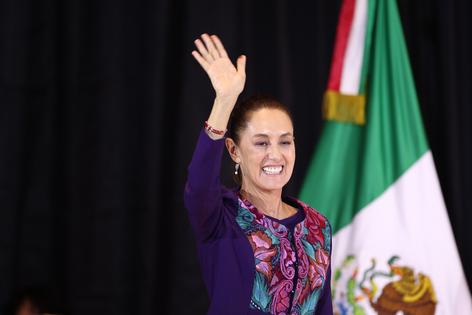Mexico Elected its First Female President. But Has it Marched Past its Own Machismo?
In Mexico, congratulations can quickly turn into criticisms and even condolences.
The women of Mexico received both recently, in rapid succession, facts that only underscore the implied sexism of critics in recent days.
Is Mexico moving forward or backward with a woman now leading the nation? They ask.
More pointedly, will more Mexican women in elected leadership mean that the corruption and violence that has undercut much progress for our southern neighbor will finally meet their match?
Mexico is North America’s largest import partner. It overtook China early in 2023.
But the U.S. appetite for drugs and our firearms have helped fuel Mexico’s homicides, extortion and overall violence.
All of this is context to the historic achievement of the new President-elect Claudia Sheinbaum Pardo. She won a landslide victory by nearly 60 percent – becoming the first female president.
And yet, some naysayers immediately pounced to undercut the accolades. They insinuated that Sheinbaum, the protege of outgoing President Andres Manuel Lopez Obrador, merely rode on his coattails into the top elected post.
It’s true that Sheinbaum was brought into his cabinet where she was mentored into running for herself. But she’s hardly an incompetent understudy. Trained as an engineer, she served until last year as the mayor of Mexico City, a metropolis of 22 million people.
She won a Nobel Peace Prize in 2007 for research with other climate scientists through the United Nations.
But a violent reminder of the challenges of governing in Mexico came the day after the presidential election.
Another woman, the mayor of a city in the west of the country, was assassinated. Yolanda Sanchez Figueroa of Cotija in Michoacán was ambushed and murdered, along with one of her body guards. A truck drove by them and bullets flew.
The assassins are believed to be cartel members or their associates. It is believed that they murdered her in retaliation, because she pushed back on allowing control of the city’s police to be turned over to the cartel.
Such corruption and retaliation upon those who balk is endemic in Mexico, and speaks to the unrelenting power of the drug cartels.
Sanchez had been kidnapped last year, presumably from the same cartel. Members of the cartel grabbed her from a mall in Guadalajara and held her for three days.
Death threats, now carried out, were reportedly issued for her.
There is no code of honor, no respectful nod to matriarchy that will keep women politicians in Mexico any safer from the brutal cartels.
It’s a truth that needs to be factored into the hope that Mexicans now have after Sheinbaum’s election. One of the greatest hurdles that she faces are the cartels that contribute heavily to the homicide rate of 30,000 people a year.
The violence has targeted elected officials as well as those running for office. In 2023, more than two dozen politicians and candidates were murdered. And yet, it’s fair to ponder if Mexico’s push for parity between male and female elected officials can reduce corruption and graft.
Beginning in the mid-90s, activists and some political parties in Mexico began pressing for more female candidates.
Their push for greater gender parity was incremental. But eventually, it was mandated by electoral reform. In 2019, constitutional reformers called for gender parity among the candidates for all of the political parties in all races, local and national.
Sheinbaum’s election is the most notable result.
Mexico will also soon have female governors of nearly half of its 32 states.
Comparisons to the U.S. are almost always helpful in trying to understand Mexico.
Women in the U.S. won their right to vote in 1920. The nation never passed the Equal Rights Amendment and obviously is still at least a federal election cycle away from another opportunity to vote for a female presidential candidate.
Mexico, by contrast, took far longer (until 1953 to give women the right to vote.)
How women might govern the country differently than men will continue to play out, and hopefully will spur research and wise assessments, as opposed to political snark or easy sexist takes.
Sheinbaum is already being criticized, much of it fair, for not putting forth strong policies to curb the nation’s violence, including the high rates of femicide. The nonpartisan Wilson Center has written extensively and specifically on her candidacy and election.
But the D.C.-based center also offered congratulations to Sheinbaum, Mexico and all of its women, collectively, for many have made great sacrifices, including the lives taken by femicide:
“Her election reflects the incredible social, cultural, and institutional transformation the country has undergone. It is the result of the struggle of thousands of women who have worked for decades to not only have a voice and representation, but also to be able to make decisions at the highest levels.”
========
(Readers can reach Mary Sanchez at msanchezcolumn@gmail.com and follow her on Twitter @msanchezcolumn.)
©2024 Mary Sanchez. Distributed by Tribune Content Agency, LLC.
























Comments